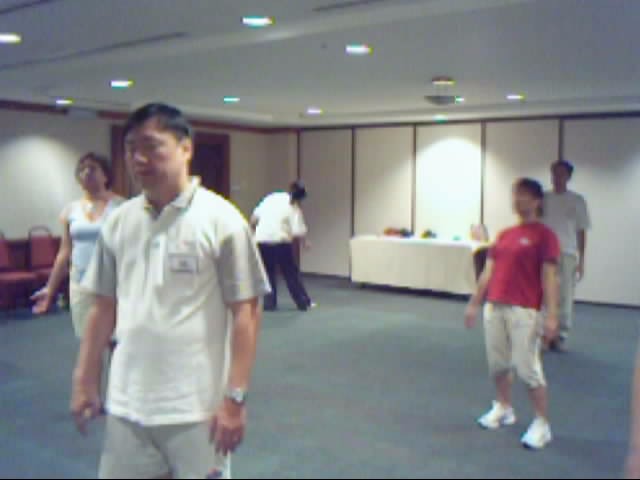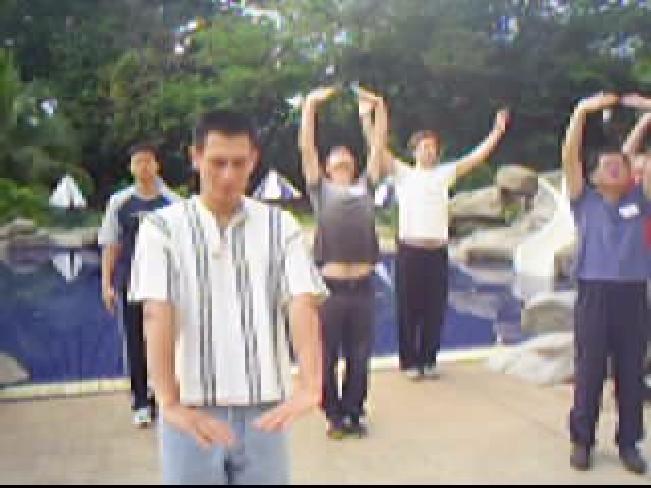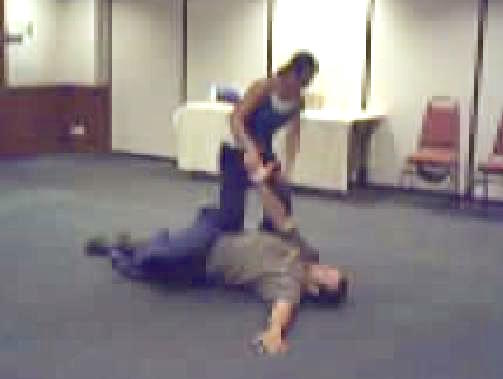June 2006 (Part 2)
SELECTION OF QUESTIONS AND ANSWERS

Participants at the Intensive Chi Kung Course of January 2006 directing chi to flow to various parts of their body
Question 1
Two years ago I bought a chi kung tape. I practiced it half heartedly for about 5-7 months on and off. I found it made me feel good and healthy. I quit the practice because I learned it wasn't healthy to practice chi kung from a tape. Learning about this created a lot of fear and still does. I later started having weird experiences due to drug use. I fear the combination of chi kung and drug use created terrible imbalances within me.
— Bradley, USA
Answer
The real harm is not from the chi kung you practiced on your own, but from the fear created by yourself. In Chinese term it is known as “xin-mo” in Mandarin, or “sam-mo” in Cantonese. Literally it means “heart-monster”, and is derived from the concept of “mara” (“imaginary monster”) taught by the Buddha. You have created from your own imagination a monster in your heart.But you can clear away this “heart-monster” in the following way. Readers of this Question-Answer series who have similar problems can also use this method which is quite safe to practice on your own.
Early in the morning go into the open. If the weather does not permit, practice the method in front of a window. Stand upright and be totally relaxed. Breathe in and out naturally, and gently be aware of your breath.
Then as you breathe out, think of the “heart-monster” or the fear in your heart going out with your breaths. Do this about 10 to 20 times.
Next, look up into the sky and think of God or a divine being you believe in. If you do not have any particular divine being, just think of the Supreme Being above. Ask God or the Supreme Being to give you strength and guidance so that you will live the day in a way He (or She) will approve of. Then breathe in and out gently for about 10 to 20 times, gently visualizing or thinking of the strength of God or the divine being flowing into you.
Repeat the procedure before you go to bed at night, but instead of asking for strength and guidance from God or the divine being, thank Him (or Her) for enabling you to live the day in a way He (or She) is proud of. Then give a blessing to anyone you like in any way you like.
Question 2
I came from a dysfunctional family and my best friend and older brother (father figure) was a gang member and went crazy and suicidal more than a few times which led to fights between me and him. I have quit all drugs now and also saw a shamanic healer who journeyed on my behalf for which I am very grateful. I feel much better now and stable but still have bouts of depression and fear and I believe energy imbalance.
Answer
Congratulations for leaving drug use behind and starting a new life. In the words of a Chinese saying, if you regret your previous wrongs and start to lead a righteous life, you are worth more than your weight in gold. Irrespective of whether you will be very successful or lead a normal life, if you are righteous and kind in your dealings with others, and find simple joys in whatever you do, your life here will have been very meaningful. In this way you will soon find your depression disappear.
Depression is a result of imprisoning your spirit. The causes of this imprisonment are many and varied, but you need not have to know them in order to be free from depression. What you need to do is to free your spirit.
There are numerous ways to free your spirit. Practicing chi kung, such as “Lifting the Sky” or “Carrying the Moon”, is one excellent way. Another excellent way is what I have described to you, which is taking in the strength and guidance of God or your divine being, leading a righteous life, being kind to others and finding simple joys in whatever you do.
The gentle flow of divine strength and guidance through you will open the blockage that has imprisoned your spirit, your sense of righteousness and kindness will ensure and nurture this divined flow, and finding joys in simple things will let your spirit expand. If you can also practice the chi kung exercises, which you can read from my books, your result will be enhanced. But even if you cannot practice good chi kung, the method I have described to you will be sufficient to free you from depression.
Surely you would like to help your older brother to lead a meaningful life too. You may like to teach him the method I have described for you, but you shouldn't, at least not now. If you tell him the method, not only it may not help him, it may even spoil his chance of using it in future. He is not ready, his heart is still close. You are different. You have regretted your previous wrongs, and not only you want to live a better life, you took steps to do so.
A good way to help him is by example. When he sees that you are peaceful and happy, he may want to be too. When he asks you how you change your miserable life to a happy one, you should not tell him my method yet. He is your older brother and your father-figure. Hence you lack the kind of impact on him to make him change. Most likely he asks you out of curiosity, or at best for theoretical information. He may not carry out the practice.
What should you do, then? Ask him to write to me, or seek the advice of a spiritual teacher. He must want to change, and want it enough to put in his own effort.
Question 3
I picked up a book of internal exercise. I was very cautious not to practice anything advanced. Some of the exercises seem quite basic and safe. There are ones where you click the teeth, massage your throat, rub your arms and legs, massage your kidneys, and rub your stomach. Are these safe to perform from a book?
Answer
Yes, these exercises are safe to be practiced on your own. But the effects are unlikely to be strong. They are unlikely to solve your emotional and spiritual problems.
This does not mean these exercises are not useful. They are useful to persons who are already healthy. Practicing these exercises will enable them to have strong teeth, good appetite, good immune system and flexible limbs even at old age, But the exercises are not strong enough to free a person from fear and depression.

Participants at the Intensive Chi Kung Course of January 2006 practicing “Lifting the Sky”, which is considered a wondrous chi kung exercise in Shaolin Wahnam
Question 4
One thing that has troubled me greatly is what the author says that one should not move energy around with visualization or thoughts because it can cause brain damage and schizophrenia and he calls it "disintegration into evil". This troubles me greatly.
Answer
The author's warning is valid but you need not be troubled by it.
The exercises the master has described are elementary, and are perfectly safe to be practiced on your own if you follow his instructions. Using visualization and moving energy about are advanced skills, which should be learned personally from a master.
If a student practicing on his own attempts to use advanced chi kung skills like visualization and moving energy despite warning from the master, the student is asking for trouble. If the student performs the exercises according to the master's instruction, and even if the student sometimes makes mistakes due to carelessness or forgetfulness, the exercises are safe and can still bring him benefits.
Question 5
I feel that once I read something warning me not to do, my mind urges to do it. It is like my intent is out of balance and wants to do the things that harm me.
Answer
This is an emotional problem not uncommon with some youngsters. The problem can be overcome — if you want to.
Whenever you feel the urge to do something which you should not do, sit down if you can or stand firmly. Then breathe out three times with your mouth open wide. You need not worry about breathing in.
Next, breathe in and out gently, simultaneously thinking of your “dan tian”. If you do not know where the dan tian is, it does not matter. Just gently think of your abdomen. Then, walk away leisurely. Feel proud that you have successfully tamed your negative emotion.
Those who suffer from such a negative emotional state, should avoid situations where their negative urge, despite their normal good sense, may suddenly prove dangerous for themselves. They should not, for example, look down from an unprotected window of a very tall building, or stand at the edge of a railway plateform even when a train is not approaching.
Shaolin Wahnam students would recognize this precaution as a manifestation of the "Safety First" principle. They may overcome this negative emotional state by strengthening their "kidney chi". A good way is to practice chi kung exercises like "Pushing Mountains" and "Nourishing Kidneys".
Question 6
Is there any explanation in traditional Chinese medicine or chi kung as to why my intent tends to "rebel", and how may I train my intent safely to be more stable? Will mindfulness, such as paying attention to my senses, hearing, tasting, feeling my body and feet etc. be a safe way to train my mind?
Answer
In the philosophy of Chinese medicine as well as of chi kung, your condition is described as “weakness of spirit”. Surprising it may be to the uninitiated, a major cause of this condition is the lack of heart-energy or of kidney-energy. The best way to overcome this problem is to learn high level chi kung from a master. It is inadvisable to learn such high level art on your own.
If this is not feasible, you should see a good acupuncturist or a good Chinese herbalist. They can help to strengthen your heart-energy and kidney-energy.
Please note that due to linguistic and cultural differences, “heart” and “kidney” here do not refer to the physical heart organ and the physical kidney organs. Conventional medical tests may show nothing wrong with these physical organs. “Heart-energy” and “kidney-energy” here are Chinese medical terms referring to the “spiritual faculty” and the “energy faculty” of a person.
Training to be mindful is good, but you are not ready for such training now. You should overcome your “weakness of spirit” first, then you can train to be mindful. In other words, you must train to have right intent before training to have presence of mind.
Editorial Note
Bradley's other questions can be found in the Selection of Questions and Answer
June 2006 Part 3
.

Combat application is an important aspect of Taijiquan training. Here Grace employs the Taijiquan pattern “Carry Tiger Back to Mountain” to throw a bigger and heavier opponent during a training session at the Intensive Taijiquan Course of January 2006 in Malaysia
Question 7
I would like you to comment on my daily workout:
- Tai chi warm up exercises -- the ones where you turn your waist from side to side and let your arms lose and many others but I don't know what they are called and its hard to describe them.
- Lifting Water -- 30 times.
- Zhang zhaung — Three-Circle Stance and a few more which I don't know the names.
- Eighteen Taiji Qigong exercises - repeat the whole set twice then go into standing meditation.
- Taijiquan form (Cheng Man Ching) then I do Pushing Hands.
- Chakra meditation.
— Ahmad, UK
Answer
I would suggest the following changes in your daily training routine.
You can drop item 4 and item 6 in your list, i.e. Eighteen Taiji Qigong exercises and chakra meditation. You should add standing meditation and combat application.
If your instructor does not teach combat application using Taijiquan techniques, you can learn them from my book, "The Complete Book of Taijiquan", or from my website.
Standing meditation can be practiced at the end of "Lifting Water", zhang zhuang, form practice or combat application.
Although they are called Eighteen Taiji Qigong Exercises, they are not part of traditional Taijiquan. They were invented by a modern qigong (chi kung) master named Lin Hou Sheng from China about 30 years ago. Many Taiji instructors, however, incorporate them into their Taiji practice.
Genuine traditional Taijiquan is qigong itself. So there is no need to incorporate other qigong exercises into it. But if one does not practice Taijiquan as qigong, he will also be unable to practice the Eighteen Taiji Qigong Exercises as qigong. In other words if he practices Taij forms as gentle physical exercise, he will also practice those Eighteen Taiji Qigong Exercises as gentle physical exercise. So it does not make much difference if you drop them.
Actually there is no need to warm up in Taijiquan. Taijiquan is a very effective martial art, which means that a practitioner, while being relaxed, is ready for combat at any time without prior warning. Warming up, therefore, is incongruous with a very effective martial art.
The so-called warming up exercise you described is not for warming up. It is meant for “bu-qi”, which means spreading qi over the body so that the practitioner can take attack on his body without sustaining injury. It is performed in qi flow, and not as a physical exercise. However, many Taiji instructors today, being ignorant of this qigong aspect of Taijiquan, use it as a physical warm up exercise.
Question 8
I would like to know that if I do chakra meditation, which chakra am I to store my energy into once I have finished.
Answer
I do not know chakra meditation, so I am unable to comment on it. But when you practice standing meditation at the end of any Taijiquan exercises, just gently think of your dan tian once or twice at the beginning. This will enable your energy to be stored at your dan tian.
Then you do not have to think of your dan tian or of anything. Your energy will still be stored at your dan tian even when you may not be thinking of it. Just enjoy the void and silence. Just before you wish to complete your standing meditation, gently think of your dan tian again.
LINKS
Selected Reading
- The Shaolin Monkey Set with Pattern Names in Chinese
- Yielding, Deflecting and Countering in One Continuous Process
- Tapping Energy from the Cosmos
- Internal Force — the Unbendable Arm
- Free Sparring at the England Summer Camp of 2005
- Experiencing Satori at Intensive Shaolin Kungfu Course — Joshua Lawson
- Seeing the Diamond and Not the Rough — Michael Chow
